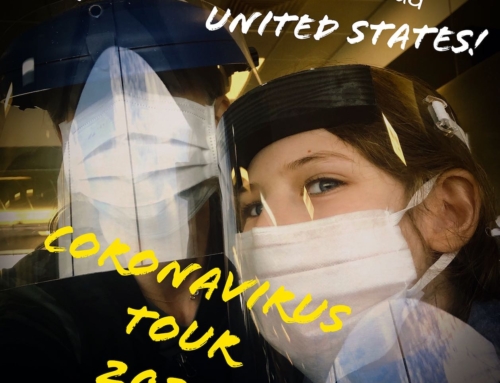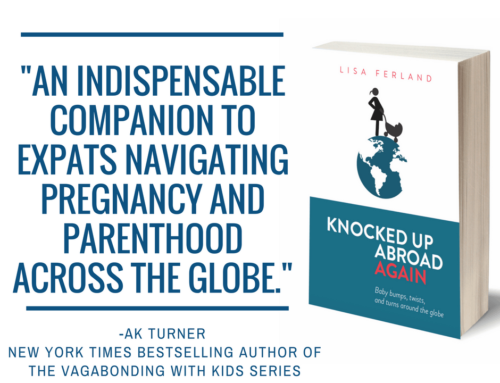 Having spent the majority of my adult life outside of the United States (mostly in small, homogeneous cities), I’ve gotten used to being the subject of conversation at the next table over. It happens pretty frequently in Vitoria. My husband and I speak in English so people assume I don’t understand their Portuguese freeing them to openly discuss me from two feet away. It happens most frequently with kids and teens, but a surprising number of adults don’t seem to realize that a person could understand both English and Portuguese. In Vitoria, we expats are like endangered wildlife. People know we’re around, but when actually spotted, locals take note.
Having spent the majority of my adult life outside of the United States (mostly in small, homogeneous cities), I’ve gotten used to being the subject of conversation at the next table over. It happens pretty frequently in Vitoria. My husband and I speak in English so people assume I don’t understand their Portuguese freeing them to openly discuss me from two feet away. It happens most frequently with kids and teens, but a surprising number of adults don’t seem to realize that a person could understand both English and Portuguese. In Vitoria, we expats are like endangered wildlife. People know we’re around, but when actually spotted, locals take note.
I don’t mind. Until visitors arrive from another planet, one from another continent is about as alien as it gets for most people in Vitoria. I signed up for the attention when I decided to become an expat.
But my daughter didn’t.
A series of encounters at the park Sunday has, for the first time, made me consider my daughter’s multiculturalism a challenge, a thing she’ll have to learn to deal with.
It also has me weighing the importance of three influences on my daughter’s behavior: my parenting instincts v. my daughter’s personality v. the culture she is growing up in. I’m now asking which of these should win out in the event they’re incompatible.
Here’s what happened.
We arrived at the park just as a craft was beginning and hurried to the classroom. As materials were being handed out, one of the helpers overheard me speaking English and asked where we’re from. I answered, heard about how he’s going to Disney World soon, and then got the VIP crafting upgrade, as he hovered over my shoulder for the duration of the activity asking repeatedly (in English) if my daughter needed help. He was pleasant and wanted to practice his English. No problem.
Then we moved to the playground and while my daughter, the baby dragon, sought refuge in a playhouse from me, the evil sorceress, a girl and boy asked what language we were speaking. I answered, their eyes widened, and they ran off. A few minutes later they were back with more friends who all crowded into the playhouse to stare at my four-year-old, English speaker. My daughter tried to play with them in Portuguese, but the older girl turned to her friends and asked, “Who wants to learn English?” My daughter was not interested in playing teacher when there was sorceress to escape from, so she turned her back on them. They were kids and curious. Ok.
The most bizarre exchange happened as my daughter and I were waiting for my husband to bring the car. We were sword fighting with sticks, so I have no idea what these people heard exactly. “Argh!” “Ah, my leg! I’m bleeding!” But whatever they heard prompted the man to turn to his friend and say “Uma italiana!” I know I opened the door to this exchange by correcting him, but I can’t live in a world where people hear an English speaking American and think Italian.
I smiled and told him “Sou americana.” Their minds were blown. The woman nearly doubled-over laughing and the man’s eyes bugged out as if this was the first time either of them had considered the possibility of a person speaking more than one language. If I had turned invisible, I think they would have been less surprised. The woman sat down on the bench next to my daughter, and the two of them began peppering us with questions, the most notable one being “So you speak Portuguese & French?” They quickly zeroed in on my daughter and began directing their questions to her, clearly not believing she speaks Portuguese and is, in fact, Brazilian. When they asked her for her name, I stiffened. When they asked her for her daddy’s name, I cut them off, said “ciao” and in their wake, made it explicitly clear she was never to give her name or mommy’s or daddy’s name to anyone other than a police officer. The couple hadn’t meant but did cross a line when they asked for personal information from my kid.
My daughter’s final audience of the day came at the end of lunch. She and I were walking back to our table with a much-anticipated chocolate popsicle, and the table next to us began exclaiming to my husband. “Nossa que olhos lindas! Uma loirinha linda!” My daughter has blond hair and blue eyes, the genetic jackpot in Brazil. The entire family at the next table gushed compliments, while my husband played along and joked it was a good thing she took after her mom.
This all happened within two hours. Nothing was said or done out of malice. The people’s motivation ranged from innocent curiosity to sincere appreciation with a heavy dash of racism. Everything interaction was typical. Brazilian culture is open and friendly and community oriented. Strangers talk to each other here. It’s like being in South Georgia without the gnats and shotguns.
But my daughter doesn’t want an audience. My husband and have noticed it. Her teachers noted it in her school report. When the group of kids crowded around my daughter asking her to speak in English, she went silent. When the geographically challenged couple asked for her name, she clutched my arm and hid her face. My daughter doesn’t like being put on the spot. And that is exactly what every stranger who asks her to demonstrate her Portuguese or English is doing. When strangers stare at my daughter, they turn her into a spectacle no matter their intentions.
So what to do about it?
My husband immediately suggested we stop speaking English outside of the apartment. This would eliminate having to always explain that my kid is Brazilian and hearing about people’s Disney vacations, but I’m against it. My daughter is immersed in Portuguese Monday through Friday all day long at school. She needs as much English as possible on the weekend. We’d also limit her English vocabulary to the world of our apartment.
My gut reaction is to tell the spectators, politely but firmly, to go away. I’ll explain that my daughter is shy and since she is Brazilian, we don’t want her to feel singled out in her home. Please, save your questions for another bilingual who’s more comfortable in the spotlight.
The problem with this solution is that it’s extremely American. Like off the charts individualistic. Walls up. Family in. Strangers out. It’s honest. It’s blunt. It’s clear. It’s rude as hell. It’s all of those things. Just depends on your cultural reference. I recently saw an article titled “I Don’t Make My Kid Share” and thought that would never fly in Brazil. Valuing individual property rights over communal harmony would brand you and your kid the biggest jerks on the playground. Not all parenting strategies work equally well in all cultures.
She is Brazilian, living in Brazil, dealing with Brazilians. Shouldn’t I do my best to teach her to understand and navigate her own culture? Is it right to protect her feelings by shutting down people in a culture where small talk is viewed as courteous? Doesn’t she need to be able to cope with the extra attention if it’s going to be part of her reality?
I want to help my daughter balance culture and her personality, and I’m not sure what to say to prepare her for the inevitable questions that come when you are the only one. I grew up a solid member of the majority in everyway possible, but she is often usually the only bilingual, the only American. A little, blue-eyed, Brazilian girl speaking English here in Vitoria is going to make people stop in their tracks and comment.
My plan so far is to tell her she should never talk to strangers without mommy and daddy around. (Safety first.) When we are around, she has an absolute right to remain silent. She doesn’t have to play with or talk to anyone she doesn’t want to. However, I’ll explain people aren’t trying to be mean. They want to learn, and she has the power to teach them. People are curious about her languages and cultures, so when she’s ready, people will be very interested in what she has to say.
And that’s the best idea I’ve got for now.






Hi Brynn…. you have presented an interesting and thought-provoking dilemma. Your tale reminded me of friends who are the daughters of a French woman, Francoise, who came to this country as a 16 year old bride with her US Army husband. They moved to my small, insular, Ohio town when the girls were in 6th and 7th grade respectively; by then their mom had been in the US for 13 years and spoke passable English which was the language of their home since the dad spoke no French. I am sure you could share some of the anguish with Francoise and her daughters. The family visited Paris for the first time when the girls were young teenagers. The mom had them dressed in their finest American clothes (always five years behind the continental fashion) with big bows in their hair. They were riding the escalator in a major department store when Francoise overheard two Parisian women snickering at the appearance of those two clearly American girls. Francoise turned to them, thanked them for their interest and asked them for directions. We all hoped those women were duly mortified at their arrogance and snobbery. In short, what you and Audrey are experiencing is not new and not peculiar to small towns. Francoise had a deprived childhood in France because of the German invasion during WWII. Her husband’s boss in our small town was married to a German woman (another story for another day). The German woman tried so hard to endear herself to the community and to this French-American family, but Francoise just could not handle the history of her childhood. In reflection with your situation, I think you may need to focus on “nature” — handle the situation as it will help Audrey and her personality…you can’t break the will of the child for the sake of saving face in a culture; she’ll learn “culture” through acculturation with her dad, his family and her schoolmates. Her dad and his family can be the ones who provide this part of the “nurture.” You need to take a long view…like five years in the future. Like my friends who are half French, Audrey will always be that. The older sister has not embraced her French-ness but the younger one has. So one’s innate personality plays a huge role in how the child faces society. No matter which language you choose to use in public, English or Portuguese, you will always be different and by association so will Audrey. Francoise always spoke with an accent, though her pronunciation improved so much over the years. But when she and her daughters were in public, as soon as opened her mouth, she and they were set apart. I don’t know what they felt, but it could be why the older one never embraced her French side. When you and Audrey get inquiries about language, perhaps you can simply ask her (in both English and Portuguese!) if she wants to say something. She gets to control the situation. With the Walt Disney thing… I am probably guilty of doing the same thing–when I meet someone from a place where I’ve been, I make some inane (not to me, but probably to the other person)comment about something I remember from their home country / city. It is a way to make a connection and brag a little bit, at the expense of another person’s patience. Everything will work out just fine…that I can say with great assurance! Emily
great stories. my wife is from BH in the state of MG. Not many tourists there either. And yes, people are intrigued when they meet us; although not in such a strange way. It has a friendly feeling about it when they ask about our language and whereabouts.
It’s a wonderful country with great people.
None of the people who came up to us this weekend were anything less than friendly, and I’m happy to answer questions about what brought me to Brazil and how I like it here. The problem is that my daughter doesn’t want the attention, no matter how nicely the questions are put. There’s a huge difference between approaching an adult who is open to a conversation and cornering a child who is trying to hide. No matter how friendly the person asking questions is. Also, my daughter is “home”. She’s not a tourist or an expat, yet she gets singled out and questioned as if she is. So how to get the abundance of friendly people in Vitoria to respect my daughter’s wishes and ignore her? That’s what I’m struggling with at the moment.
Hi Brynn, not sure I have the answer to that. I’m a Brazilian expat living in the US,but before that we lived in England. Although my daughter was born in the US, we moved to the UK when she was 3 months old and returned to the US when she was 5. People would stop to talk about her British accent. At school, she was the center of attention, which she hated so much (she also doesn’t like all that attention) that as a result she made every effort to speak like an American within 6 months, if that. And just an FYI, when she was little I’d speak to her in Portuguese and she’d answer back, but it got to a point when she would refuse to speak to me in Portuguese, lately she changed her mind and now she started on the Portuguese wagon again, I truly think that it was the attention thing as well, she didn’t want to be seen speaking a different language than everyone else. So, at some point, it might happen with your daughter, I hope not, as you know, each child is different.
Good luck!
I’m definitely anticipating a point at which my daughter won’t speak English in public here in Vitoria, and I have no problem with that. I completely understand if she doesn’t want to be a spectacle. She just won’t be allowed to tease mommy for her inability to pronounce the ão sound correctly.